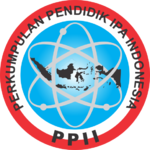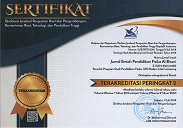An Identification of Physics Pre-Service Teachers' Science Process Skills Through Science Process Skills-Based Practicum Guidebook
Abstract
This research was conducted to identify the science process skills of the physics education students of Jambi University in prism refraction practicum after using the basic physics practicum guidebook II. This research is a quantitative descriptive method. The study was conducted with a sample of 91 students. Data collection techniques were carried out using a science process skill observation sheet which was supported by interviews and documentation. Data were analyzed using descriptive statistics. The results showed that most students are highly skilled in implementing science process skills-based practicum with the following percentages: observing by 48.35%, classifying by 38.46%, measuring by 39.56%, predicting by 58.64%, compiling data tables by 51.65%, making graph by 58.24%, planning the experiment by 61.54%, and conducting the experiment by 45.05%. The students were also quite skilled in constructing hypotheses and defining variables with the percentage of 57.14% and 39.56%, respectively. The results of the study are expected to be used as a consideration for study programs and other faculties at Jambi University as well as other universities to conduct related studies.
Keywords
Full Text:
PDFReferences
Agustina, P., & Saputra, A. (2016). Analisis Keterampilan Proses Sains ( Kps ) Dasar Mahasiswa Calon Guru Biologi Pada Matakuliah Anatomi Tumbuhan ( Studi Kasus Mahasiswa Prodi P . Biologi Fkip Ums Tahun. Seminar Nasional Pendidikn Sains, 71–78.
Akinbobola, A. O., & Afolabi, F. (2010). Analysis of Science Process Skills in West African Senior Secondary School Certificate Physics. American-Eurasian Journal of Scientific Research, 4(5), 234–240.
Ambarsari, W., Santosa, S., & Maridi. (2013). Penerapan Pembelajaran Inkuiri Terbimbing Terhadap Keterampilan Proses Sains Dasar Pada Pelajaran Biologi Siswa Kelas VIII SMP Negeri 7 Surakarta. Jurnal Pendidikan Biologi, 5(1), 81–95.
Deta, U. A., Suparmi, & Widha, S. (2013). Pengaruh Metode Inkuiri Terbimbing Dan Proyek, Kreativitas, Serta Keterampilan Proses Sains Terhadap Prestasi Belajar Siswa. Jurnal Pendidikan Fisika Indonesia (Indonesian Journal of Physics Education), 9(1), 28–34. https://doi.org/10.15294/jpfi.v9i1.2577
Deviyanti, L., Ashari, & Kurniawan, E. S. (2016). Pengembangan Panduan Praktikum Fisika Berbasis Research Based Learning untuk Mengoptimalkan Domain Kognitif dan Psikomotorik Siswa di SMA Negeri 5 Purworejo, 9(2), 43–48.
Espinosa, A. A., Monterola, S. L. C., & Punzalan, A. E. (2013). Career-Oriented Performance Tasks in Chemistry: Effects on Students’ Critical Thinking Skills. Education Research International, 2013, 1–10. https://doi.org/10.1155/2013/834584
Gall, M. D., Gall, J. P., & Borg, W. R. (2003). Educational Research: An Introduction (7th ed.). Boston: Pearson Educational Inc.
Idiege, Joseph, K., *Nja, Cecilia, O., Ugwu, & N3, A. (2017). Development of Science Process Skills among Nigerian Secondary School Science Students and Pupils : An Opinion, 1(2), 13–21.
İdris, D., & Halil, K. (2016). Determination of Prospective Preschool Teachers’ Science Process Skills. Journal Of European Education, 6(1), 32–42. https://doi.org/10.18656/jee.65104
Jack, G. U. (2013). The Influence of Identified Student and School Variables on Students ’ Science Process Skills Acquisition. Journal of Education and Practice, 4(5), 16–23.
Lindrawati, B., & Rohandi. (2015). Keterampilan Proses Sains Calon Guru Fisika, (April), 2013–2016.
Misbah, Mustikawati, M. Feyzarrif’at, M. D. P. (2018). Pengembangan Penunjuk Praktikum Fisika dasar I Berbasis 5M untuk Melatih Keterampilan Proses sains dan karakter WASAKA. Jurnal Fisika FLUX, 15(1), 26–29.
Mutisya, S. M., Rotich, S., & Rotich, P. K. (2013). Conceptual Understanding of Science Process Skills and Gender Stereotyping : a Critical Component for Inquiry Teaching of Science in Kenya ’ S Primary Schools. Asian Journal of Social Sciences and Humanities, 2(3), 359–369.
Nasrodin, Hindarto, N., & E, Supeni, S. (2015). Analisi Kebiasaan Bekerja Ilmiah Mahasiswa Fisika Pada Pembelajaran Mata Kuliah Praktikum Fisika Dasar, 4(1), 1–6. Retrieved from http://journal.unnes.ac.id/sju/index.php/upej%0AANALISIS
Puspita, Sicilia, A. (2016). Dalam Lks Biologi Kelas X Yang Digunakan Oleh Siswa Man Di Kota Yogyakarta the Analysis of Science Process Skills Developed in Lks Biology Class X, 5(1), 30–39.
Rauf, R. A. A., Rasul, M. S., Mansor, A. N., Othman, Z., & Lyndon, N. (2013). Inculcation of science process skills in a science classroom. Asian Social Science, 9(8), 47–57. https://doi.org/10.5539/ass.v9n8p47
Rezba, Spragule, Fiel, Funk, Okey, & Jaus. (1995). Learning and Assessing Science Process Skill. Dubuque, IA: Kendall/Hunt Publishing Company.
Sari, P. M., & Zulfadewina. (2018). Profil Penguasaan keterampilan Proses Sains Mahasiswa program Studi Pendidikan Guru Sekolah dasar. Jurnal Inovasi Pendidikan Dasar, 3(2), 65–72. Retrieved from http://jipd.uhamka.ac.id
Sugiyono. (2016). Metode Penelitian: Kuantitatif, Kualitatif dan R&D. Bandung: Alfabeta.
Wiwin, E., & Kustijono, R. (2018). The use of physics practicum to train science process skills and its effect on scientific attitude of vocational high school students The use of physics practicum to train science process skills and its effect on scientific attitude of vocational high sch.
DOI: http://dx.doi.org/10.24042/jipfalbiruni.v7i2.2690
Refbacks
- There are currently no refbacks.

Jurnal ilmiah pendidikan fisika Al-Biruni is licensed under a Creative Commons Attribution-ShareAlike 4.0 International License.
![]()







